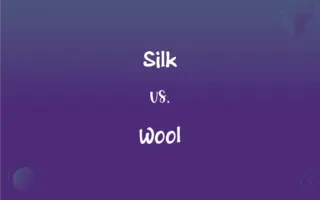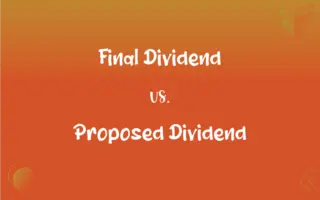Brute Force vs. Exhaustive Search: What's the Difference?
Edited by Aimie Carlson || By Harlon Moss || Published on December 11, 2023
Brute force is a straightforward approach to solving problems by trying all possible solutions. Exhaustive search methodically examines all possible solutions to find the best one.

Key Differences
Brute force involves solving a problem by trying all possible combinations or permutations until the correct solution is found. It’s a simple, yet resource-intensive method. Exhaustive search is a more systematic approach, reviewing all possible options in an orderly manner to find the optimal solution. It is thorough but can be time-consuming.
In a brute force method, there is no regard for efficiency or cleverness; it relies on sheer computational power and can be used for a variety of problems. Exhaustive search, while similar in trying all possibilities, often follows a more structured approach, potentially categorizing or ordering the search process to be more methodical.
Brute force is often used in contexts where the number of possibilities is not prohibitively large, or where there is no better algorithm available. It's about trial and error. Exhaustive search, on the other hand, assumes that the total number of possibilities is manageable and systematically works through them, possibly employing strategies to reduce the search space.
A brute force approach can be seen as less sophisticated, often used when simplicity is more important than efficiency. It doesn’t require prior knowledge about the problem. Exhaustive search may require some understanding of the problem domain to structure the search effectively, aiming for a more efficient exploration of all possibilities.
Brute force can be less effective for complex problems with a vast number of possible solutions due to time and resource constraints. Exhaustive search is also constrained by the number of possibilities but attempts to be more organized and efficient in exploring these possibilities, sometimes employing optimization strategies.
ADVERTISEMENT
Comparison Chart
Approach
Tries all possibilities without a particular order or strategy.
Systematically examines all options in a structured way.
Efficiency
Often inefficient, relying on computational power.
More methodical, potentially more efficient in certain cases.
Use Cases
Used when no better solution is available or for simpler problems.
Employed in scenarios where all options can be methodically explored.
Complexity Handling
Less effective for complex problems with many possibilities.
Can handle complexity better with a structured approach.
Knowledge Requirement
Requires little to no understanding of the problem.
May require some knowledge to structure the search effectively.
ADVERTISEMENT
Brute Force and Exhaustive Search Definitions
Brute Force
A technique in computing where every possibility is checked until the solution is found.
Decrypting the code required a brute force approach, trying every key combination.
Exhaustive Search
Systematically examining every option to ensure no possibility is overlooked.
To ensure accuracy, they conducted an exhaustive search of the database.
Brute Force
A method where all conceivable solutions are attempted.
To solve the maze, they employed brute force, exploring every single path.
Exhaustive Search
A problem-solving strategy where all conceivable options are evaluated systematically.
The research involved an exhaustive search of all the relevant literature.
Brute Force
An approach that relies on sheer computational power to solve problems.
To solve the puzzle, they used a brute force method, testing every possible configuration.
Exhaustive Search
A methodical approach to problem-solving by exploring all possible solutions in an organized manner.
The algorithm used an exhaustive search to find the optimal route.
Brute Force
A straightforward problem-solving technique that tries every possible solution.
The password was cracked using a brute force attack, trying every combination.
Exhaustive Search
Exploring every possibility but in an orderly and methodical manner.
To find the lost key, an exhaustive search of every room was conducted.
Brute Force
Solving problems by testing all possible options, regardless of efficiency.
He used brute force to find the correct answer by checking each possibility one by one.
Exhaustive Search
A thorough technique that considers all potential solutions in a structured way.
In chess, sometimes an exhaustive search is used to evaluate all possible moves.
Brute Force
Alternative spelling of brute force
FAQs
How does exhaustive search differ from brute force?
Exhaustive search is more structured and systematic compared to the more straightforward brute force approach.
Is brute force always effective?
Brute force is not always effective, especially for problems with a vast number of possibilities.
When is brute force used?
Brute force is used when there are no more efficient algorithms available or for simpler problems.
What is an exhaustive search?
An exhaustive search is a methodical approach to problem-solving by systematically exploring all possible solutions.
How do time and resources affect brute force methods?
Brute force methods can be resource and time-intensive, making them impractical for complex problems.
How does exhaustive search aid in decision-making?
Exhaustive search aids in decision-making by thoroughly exploring all options, ensuring the best choice is made.
Can exhaustive search be applied to any problem?
While exhaustive search can be applied broadly, it’s most effective when the number of possibilities is manageable.
What is brute force?
Brute force is a problem-solving technique that involves trying every possible solution until the right one is found.
Why is brute force considered inefficient?
Brute force is considered inefficient because it does not use any strategy to narrow down possibilities.
Does exhaustive search guarantee finding the best solution?
Yes, exhaustive search guarantees finding the best solution since it explores all possible options.
Can exhaustive search be used in computer programming?
Yes, exhaustive search is often used in computer programming to find optimal solutions.
Is brute force suitable for password cracking?
Brute force can be used for password cracking by trying every possible combination, but it’s time-consuming.
Can brute force be used in mathematical problems?
Yes, brute force can be used in mathematical problems where all potential solutions are tested.
How do brute force and exhaustive search compare in speed?
Both methods can be slow, but exhaustive search can sometimes be faster if it’s well-structured.
What are the drawbacks of brute force?
The main drawbacks of brute force are its inefficiency and the high amount of time and computational power required.
What skills are needed to implement an exhaustive search?
Implementing an exhaustive search requires analytical skills and understanding of the problem to structure the search effectively.
Is exhaustive search practical for large data sets?
Exhaustive search can be impractical for very large data sets due to the immense time and resources needed.
What is the main benefit of using exhaustive search?
The main benefit of using exhaustive search is its thoroughness, ensuring no potential solution is missed.
In what situations is exhaustive search preferred?
Exhaustive search is preferred in situations where it’s feasible to systematically examine every possibility.
How does brute force impact computer security?
In computer security, brute force attacks can be a threat, as they attempt to guess passwords or encryption keys.
About Author
Written by
Harlon MossHarlon is a seasoned quality moderator and accomplished content writer for Difference Wiki. An alumnus of the prestigious University of California, he earned his degree in Computer Science. Leveraging his academic background, Harlon brings a meticulous and informed perspective to his work, ensuring content accuracy and excellence.
Edited by
Aimie CarlsonAimie Carlson, holding a master's degree in English literature, is a fervent English language enthusiast. She lends her writing talents to Difference Wiki, a prominent website that specializes in comparisons, offering readers insightful analyses that both captivate and inform.






































































